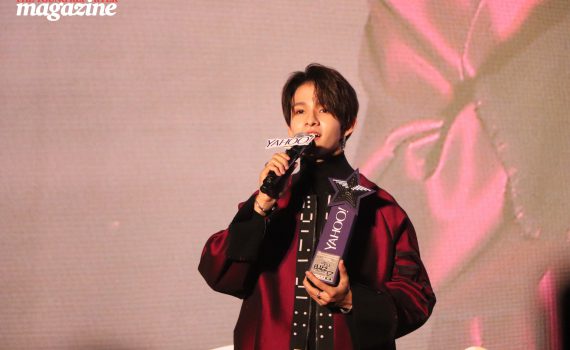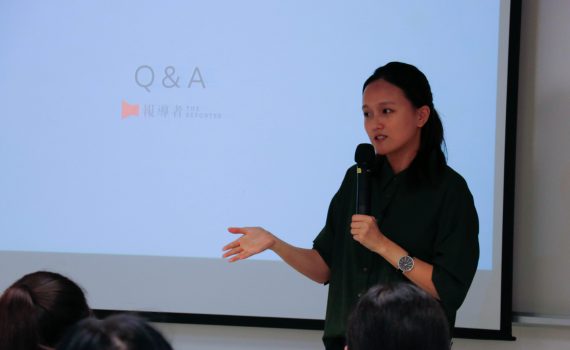Media

Hong Kong's news media faces practical challenges in face of global digitalisation
- 2018-10-12
- The Young Reporter
- By: Stephanie Ma、Hailey ManEdited by: Jade Li
- 2018-10-12
The traditional mass media in Hong Kong is slow to strategise its use of digital technologies compared to news outlets worldwide, media professionals said on October 6 at the 2018 European Study Tour Seminar organised by the Journalism Education Foundation. "Digitalisation has drastically transformed the international media landscape in recent years. Whilst a myriad of European news organisations have already undergone major structural transformations, most media organisations in Hong Kong have not responded to these trends," Raymond Li, a senior lecturer of the Hong Kong Baptist University's Journalism Department said. Attended by tens of journalism students from local universities, the post-tour event was centred mainly around reflective observations several media persons made after comparing the digital transformations of news organisations between Europe and Hong Kong. "Traditional news outlets in Hong Kong are very conservative when it comes to embracing digital transformation as the risk is often very big," said Siu Sai-Wo, CEO and Executive Director of Sing Tao News Corporation Limited. Mr. Siu stated vast differences in the operating mechanisms of online and print media as one of the risks media companies have to bear in case of investment failure. Now that is technology being more prioritised over content, new media journalists face more pressure to produce innovative online content, leading to a surge in churn rates amongst some media companies. Mr. Siu added that some companies also need to retrain employees who had only received conventional journalism training. Mr. Li believed that Hong Kong's media sector lacked an explicit digital development strategy as some still expect room for the traditional media to thrive. "When it comes to developing innovative new media products, we also lag behind in investment and expertise," he continued. South China Morning Post is one of the few companies that have started to incorporate breakthrough technologies …

Yahoo Asia Buzz Awards handed out to "buzziest" icons in 2017
- 2017-12-07
- Society
- The Young Reporter
- By: Wing LiEdited by: Jianne Soriano
- 2017-12-07
The 2017 Yahoo Asia Buzz Awards was held on December 7 2017 at the Hong Kong Cultural Center. Based on search results from Yahoo's search engine, the annual Buzz Awards rewards the "buzziest" icons in the Asia-Pacific region. The awards show this year featured appearances from popular Hong Kong celebrities like Vincent Wong, Chrissie Chau, Kara Wai and Natalie Tong. Some of the notable winners include Hacken Lee, who won the awards for the "Top Buzz Local Male Singer" and the "Top Searched Song of the Year." C AllStar, Dear Jane and Supper Moment also won the "Top Buzz Local Group" award. The main highlight and closing act of the show is K-pop star Samuel Kim, who received the award of the :Most Searched Korean New Singer." He also performed three songs and closed the event. Reported by Wing Li Edited by Jianne Soriano Photos by Jianne Soriano

Uncovering invisible slavery: the underbelly of Taiwan's fishery industry
- 2017-10-26
- The Young Reporter
- By: Michelle Ng、Ezra Cheung、Alexandra LinEdited by: Choy York Borg Paulus
- 2017-10-26
"Taiwan is an island, surrounded by ocean, but it seems that most people are not familiar with its fishing industry," Cheng Han-wen, a Taiwanese investigative journalist said. Initially, Cheng and her team wanted to write about the decline in capture fisheries. However, when they were carrying out an interview with a fishery overseer, they discovered the industry's enslavement of young Indonesian fishermen by accident. "The stories about the exploitation of fishermen are rarely covered," added Cheng, "because the Taiwanese media often focus on the epic grandeur of its offshore fishery." The discovery later guided them to an Indonesian village, where eight in ten villagers said they had been to Taiwan, as some of them were proficient in Mandarin. A villager who used to work in Taiwan's fishing industry was mentally traumatised; another "jumped to his death", according to Cheng. Cheng and her team have won three SOPA awards in 2017 on reporting about the exploitation in the Taiwanese fishing industry . "The ship master has also beaten me up," Cheng quoted from her interview with Supriyanto, a fishery labourer from Central Java, Indonesia and was later found dead in a Taiwanese commercial offshore fishing vessel due to sepsis. Reduced to a bag of bones, his dead body was then sent back to his home in Central Java. Although his story had been covered by several outlets, no one went as deep as The Reporter: An award-winning alternative media composed of ten journalists and three photojournalists, specialising in investigative and in-depth reporting. "If a fisherman and a fish were to drop into the ocean at the same time, no doubt the fish would be rescued first." said Cheng. Despite receiving international recognition for the story, the young journalist still feels powerless about the issue because the coverage has not brought about immediate change in the society. …

Reporters still hold a crucial position in tech-centric data news production
- 2017-10-25
- The Young Reporter
- By: Jade Li、Caroline Kwok、Elly WuEdited by: Daniel Ma、Sean Hsu
- 2017-10-25
Comparing to computer science students that possess coding knowledge, journalism students still have advantages to enter the data news industry as they are better at making sense of data, said SOPA award winner Ashely Wei. The Caixin Vislab data news designer gave a sharing lecture on basic tools used in data news industry with students of Hong Kong Baptist University on Oct 25 at the SOPA Award Winners Forum. Ms Wei said cooperation between journalists, programmers and art directors is crucial in producing a news piece with data visualisation. "One of the biggest challenges for web designers is they know the technical aspect of presenting data but they don't know how to represent data in a sensible way and that is when journalists come into play," Ms Wei said. Wei also introduced "ready-to-use tools" to help journalists who have no prior knowledge of coding to represent data such as three.js, d3.js and Tableau. "In data journalism, trends and patterns are more important than data itself. People don't want to see details but the trend," said Wei. She divided data journalism into data and building news website. She said the main purpose of data journalism is to keep readers involved in the stories. "Data is broader than information. Journalists not only need to write stories but also need to find proper ways to present them," said Wei.

"As Simple As Possible" - Developer of CaiXin VisLab Talks About Data Visualization
- 2017-10-25
- The Young Reporter
- By: Windy LI、Zoya ZhaoEdited by: Choco Tang
- 2017-10-25
The HKBU-SOPA Award Winners Forum with the award-winning journalist- Ashley Wei, reveals the principle of data visualization is making things "As Simple As Possible" and shares the skills of data visualization. Ashley Wei, a data visualization designer and developer of CaiXin VisLab since 2015, has been awarded the SOPA Awards for three times since 2015. Wei revealed how to integrate arts and programming methods into projects to explore data news storytelling. "Data journalists should have a basic idea about programming to keep a good relationship with visualization developers and control the whole journalistic project" she said. "Data visualization is all about mapping, and there are two kinds of data- geographic coordinates which can be transferred to screen coordinates and even 3D, and value which can be changed to attribute." Wei said. "The importance of data visualization is showing the trend of the issue." she added. Three architecture ways were raised by Wei for organizing data- long-form (the story is shown in one page), slide show (the story is presenting in PowerPoint); and full screen (the story is shown within one screen), among which slide show is the most powerful presentation on mobile phone. Also, Wei pointed out that Excel is not as technology-lacking as people think. In fact, it's a good tool to visualize data since it can convert data to different types of chart efficiently. The HKBU-SOPA Award Winners Forum is a 4-day event inviting SOPA-award winners to participate in lectures and discussions on the journalism profession. Students are welcome to join from now to October 27th in designated venue in Hong Kong Baptist University.

November 6, 2016 - Connaught Road West, Hong Kong
- 2016-12-15
- 2016-12-15
by Ng Yi Shu Around 2,000 protesters took over an intersection between Western Road and Des Voeux Road West yesterday (Nov 6) to protest the Chinese government's decision to interpret the Basic Law over an oath-taking controversy. The protesters - who split from an afternoon march to the Old Supreme Court Building - attempted to gather outside the China Liaison Office, where police had set out cordons. Several attempts to breach the cordon saw police responding with a red warning flag and pepper spray. (Edited by Hilda Lo)

SOPA 2015 - Take every lead and never let a story go, says a Filipino investigative reporter
- 2015-10-17
- 2015-10-17
By Natasha Fernandes Before sending out under-covers and getting in touch with whistle blowers, an investigative reporter must smell the potential wrongdoings first, says Nancy Carvajal, reporter at The Philippine Daily Inquirer. "With the correct mindset and skills, anyone here can be an investigative journalist, as long as you have the perseverance, interest, curiosity, and the will to follow through the things you know are wrong," she said. Ms Carvajal is one of six SOPA-winning journalists speaking at Hong Kong Baptist University this week. Having studied in Economics in college, she took her first step as a newsroom assistant, which gave her the chance to learn and observe. She said "the nose for news" makes a great investigative reporter. During her career, she often picked up story leads ignored by others. After reading a news story about the rescue of a kidnapped victim, who knew about his employers' illegal activities, she had a gut feeling that things were going wrong. She noticed that public money were mentioned in the police report and decided to look into it. That investigation finally led to the exposure of a corruption case involving more than 100 legislators. "When it comes to public money, it is of immediate public interest," she said. Besides curiosity, Ms Carvajal said the skills of "verifying and validating" are essential to make sure the stories will not be challenged. During her investigative reporting, she always made sure she had enough sources and witnesses for crosschecking. "As long as it's the truth, you do not let the story go away." (Edited by Christy Leung and Viola Zhou. Copy-edited by Joey Hung.)



